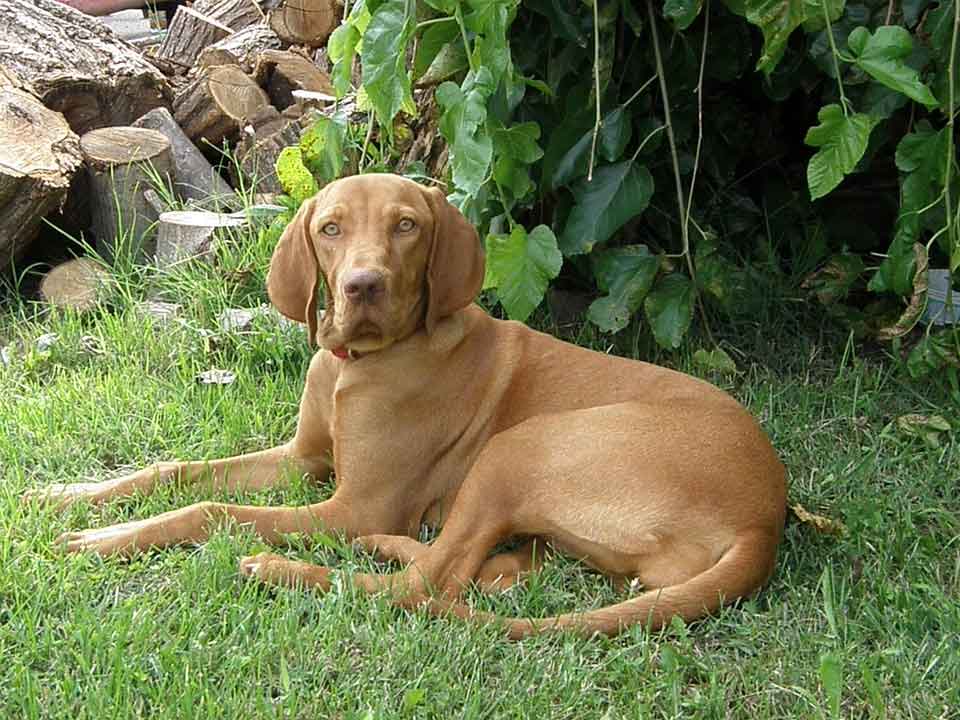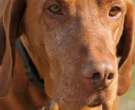Content |
|---|
History
The long history of Hungarian Braco (often called Vizsla, as in your home country) is inseparable from that of the Magyar tribes. In effect, the latter were already accompanied by their ancestors when their migrations through the Russian steppes and the Carpathians ended in the ninth century and settled in the Carpathian basin., region corresponding to modern Hungary.
Writings dating from the period of King Adelbert III (1235-1270) they already refer to a “yellowish dog named Vizsla“, used by the Hungarian people for hunting. Illustrations that appear in a 14th century Carmelite book, as well as a Gothic engraving of the fifteenth century, are considered the first representations of this dog. In the 16th century, it had become commonplace among the Hungarian aristocracy and nobility, that they used it both for hunting and for the companion dog.
Numerous crosses between hunting dogs took place since the 16th century and gave the Vizsla your current appearance. There is no clear information on the different breeds used, but several sources, including the reference book The Hungarian Vizsla, written by Gay Gottlieb and published in 1985, they mention Setter, German Shorthaired Pointer, Serbian hound, English Foxhound, English Greyhound, Sloughi and Romanian dog breeds. In any case, the goal was always to keep an aspect close to their ancestors, as evidenced by his yellow color and brown nose. The latter distinguishes it from most other pointer breeds., who have a black nose.
In 1924 a breeding club was formed in Hungary and the first individuals were recorded at that time. In the Decade of 1930 the development of Hungarian Short-Haired Pointer (Vizsla) raised fears that the characteristics of the breed would be lost, but a rigorous breeding program under the aegis of the breed club made it possible to separate the breeds and prevent their characteristics from being diluted through inappropriate crossbreeding..
Like many other races, the Vizsla suffered severely during World War II, but he quickly regained his health. Already in 1954 was recognized by the International Cynological Federation (FCI), which supervises the national organizations of a hundred countries, including France, Belgium and Switzerland.
It was also in the decade of 1950 when a first specimen was imported into the United States, despite the context of the cold war. This led to the recognition of the breed by the American Kennel Club (AKC) already in 1960.
The world's leading dog associations followed suit, like the British Kennel Club (KC) in 1971 and the American United Kennel Club (UKC) in 1984. El Canadian Kennel Club (CKC), as well as a large majority of national organizations around the world also recognize it.
Popularity
Known all over the world, the Hungarian Short-Haired Pointer (Vizsla) enjoys some popularity in general. But, There are, of course, significant differences between countries.
in hungary, your country of origin, It's very common. With a total of more than 8.000 individuals registered in the “Magyar Ebtenyészt?k Országos Egyesületeinek Szövetsége“, the reference body of the country, it is even by far the most widespread indigenous breed. Its representatives are three times more numerous than those of the “Hungarian Wire-haired Pointer“.
In France, made significant progress in the last decades of the 20th century. The number of births registered each year in the French Stud Book (LOF) in the early decade of 1970 increased from about 40 to more than double at the end of the decade. Exceeded 150 at the end of the Decade of 1980, and then entered the new millennium with more than 200 births per year. The number has remained practically stable since then, fluctuando between 200 and 300 annual records, with sometimes significant variations from one year to another. These figures are still relatively modest: to the Hungarian Short-Haired Pointer (Vizsla) struggles to make a name for himself among the most popular hunting dog breeds, although it is much more popular than its wire-haired counterpart. The “Hungarian Wire-haired Pointer” does not usually have more than 50 births per year.
They are also quite discreet in Switzerland, since statistics from the Amicus database show that they are not among the 50 most numerous dog breeds in the country.
The situation is very different in Britain, where is an important and growing success. Has grown from around 1.000 annual registrations at the Kennel Club in the mid-1990s 2000 to 1.500 early in the decade 2010. This digit, already estimated, then doubled over the decade, to the point of approaching 3000 births per year.
It is also a great success in the United States, occupying the position 30 (almost 200) in the most popular breeds based on annual AKC registration statistics. His wire-haired counterpart is far behind, finishing near the bottom of the rankings at around 160th place.
It is also successful in some countries far from its homeland, like Argentina, where there is more than 4.000 specimens.
In any case, el ong>Braco Húngaro de pelo corto is generally much better established than its descendant the “Hungarian Wire-haired Pointer“. Perhaps the only exception is the Czech Republic, where there are some 5.000 of each race.
Physical characteristics
The Hungarian Short-Haired Pointer (Vizsla) it is a medium sized hunting dog. He looks a lot like his descendant the Hungarian Wire-haired Pointer, but with a shorter coat and a slightly less voluminous silhouette.
His body is almost square, slightly longer than tall, with lean, well-defined muscles that leave no room for superfluous curves. The legs are made of solid bones, well muscled and ending in slightly oval legs with brown nails.
The tail, set a little low and descending to the hock, is wide at the base and then gradually tapers towards the tip. Using this dog for hunting means that it has long been shortened by a quarter of its length to reduce the risk of injury. This practice of cutting off a dog's tail (tail docking) still practiced in some countries, but is currently banned in an increasing number of territories, including France, Belgium, Switzerland and Quebec.
The head has a broad skull, moderately domed with a moderate stop. The ears, located on the back, they are quite long (about three-quarters of the length of the head) and hang along the cheeks. The eyes are oval and brown in color, as dark as possible. The snout, pretty short, is truncated (not pointed in any way) and ends in a big brown nose, darker than fur.
The top layer is, of course, short, as the breed name suggests, but also very close and rough to the touch. But, is finer and silkier on the face and ears, a little lighter on the belly and a little longer under the tail. It's important pointing that, unlike in the Hungarian Wire-haired Pointer, the Hungarian Short-Haired Pointer (Vizsla) does not have undercoat.
Whether it is short haired or wire haired, the Vizsla should have a uniform golden wheat color throughout the body except the ears, which are darker in color. Red tones are not desired, brown or discolored. A white mark on the chest or throat is acceptable, but should not exceed 5 cm..
Finally, sexual dimorphism is well marked in the Vizsla, the male being significantly larger and larger than the female.
Varieties:
The Hungarian Short-Haired Pointer (Vizsla) appeared in the decade of 1930 as a result of a cross between two females of Hungarian Short-Haired Pointer (Vizsla) and a male of German Shorthaired Pointer. Although they are very close, They are considered two separate breeds by international and national canine organizations that recognize them, and not two varieties of the same breed.
Apart from his longer hair and his characteristic goatee, the Hungarian Wire-haired Pointer are very similar, if they are not identical, to their ancestors.
But, specialists have found that on average they are slightly larger and heavier than their short-haired counterparts. This difference is also reflected in the rules of the American Kennel Club, that describes the Hungarian Short-Haired Pointer (Vizsla) as an average of 1 cm smaller than its descendant. On the other hand, the norm of the Fédération Cynologique Internationale (FCI) -which is used by the national canine organizations of reference in France, Belgium and Switzerland- does not mention that difference.
So, if there are some more or less subtle differences in terms of appearance, the same cannot be said in terms of character: in this field, the Hungarian Wire-haired Pointer hardly differs from his alter ego the Hungarian Short-Haired Pointer (Vizsla).
Character and skills
The temperament of Hungarian Short-Haired Pointer (Vizsla) does not differ by coat length. The Hungarian Wire-haired Pointer has the same character traits.
They are very affectionate dogs and very attached to their family. But, they always feel closer to a particular member of the household, who then becomes his favorite human, and they don't try to hide their prejudice.
In any case, is much less sociable with people who are not part of the home: he is not aggressive with them, but prefers to ignore them and act as if they are not there… at least as long as they don't represent a danger to him. In fact, his closeness to his family makes him protective of both his family and his territory. Reprimands in a deterrent way when a threat approaches, and does not hesitate to intervene if necessary.
With the kids, his attitude is similar: he is close and tender with those who live with him, for whom it is an excellent playmate, but ignore his friends who come to the house, or those you meet in the park. Even worse, if you mistakenly perceive certain games with the little one of the family as an aggression on their part, your protective instincts can lead you to react violently, mostly because he's always on the prowl. In any case, know it or not, you should never be left alone with a small child, without adult supervision. This is true for any dog, regardless of race.
The Hungarian Short-Haired Pointer (Vizsla) he is very sociable with his companions, whether they live under the same roof or with strangers you meet on a walk. Having him share your home with another dog is a good way to avoid boredom if his handlers are regularly absent..
The same cannot be said for a cohabitation with a small animal, that would quickly turn sour. If you have been used to being around the domestic cat from an early age, he has every chance of being considered a full member of your family, and therefore to be left alone. On the other hand, A bird, rodent or reptile is likely to awaken the hunting instinct that has accompanied it for generations. A small animal unknown to him and that he would have the bad idea to pass by during his pilgrimages would also have every chance of suffering a sad fate.. For the same reason, it is advisable to keep it on a leash in places where the probability of such encounters is quite high.
Bred for centuries to hunt in the wild, the Hungarian Short-Haired Pointer (Vizsla) they are active dogs that must be able to spend at least an hour a day to feel comfortable on their paws. But their resistance allows them to go much further, if given the opportunity. Daily walks are the best part of the day for him, and long weekend outings that allow you to spend several hours in the desert are probably the highlight of your week. If there is a lake or a river in the way, feel free to stop there: without being particularly fond of either, loves water and is a good swimmer. Hunting is, without a doubt, the activity that most allows him to mobilize his independent spirit and his remarkable sense of smell.. It´s, with much, his favorite, but you can also excel in dog sports that also allow these qualities to be expressed, like crawl or cavity. He is also perfectly capable of learning other disciplines, so much so that it is not uncommon to see representatives of the breed on the podiums of obedience or agility competitions.
Even more, his physical qualities and his resistance also make him a great companion for those who want to run with their dog, ride a bike with him and take him for a ride. On the other hand, given your significant need for exercise, not recommended at all for elderly or overly sedentary people.
In any case, best kept on a leash in urban or residential areas to avoid drama if small animals pass by, on the other hand, remove it in the wild, so you can run free and vent. This assumes that the withdrawal orders are perfectly acquired, but even when this is the case, it is difficult to fully trust his propensity to return without delay as soon as he is asked to do so. So, it is advisable to equip your dog with a GPS dog collar, so you can easily find it if you venture a little too far, especially since he might not be able to find his way back.
As long as you are able to exercise enough each day, the Hungarian Short-Haired Pointer (Vizsla) it is perfectly suitable for apartment living, If and when, of course, is the right size for your build. Having said that, the ideal for him is still a house with a garden. It goes without saying that the garden must be perfectly closed, to prevent any attempt to chase an animal. It also, although he greatly appreciates being able to go outside at any time to stretch his legs, this dog is not cut out for spending most of his time outdoors: although he can sleep outside, appreciates the comfort of home and the proximity of his family.
But, They are not the type of dog that will follow your wishes with finger and eye. Centuries of hunting with a high degree of autonomy have made it quite independent, which can be problematic if you are faced with an inexperienced owner or one who is not able to be firm enough to command respect for your dog.
Having said that, this independence of mind does not mean that he appreciates being left home alone for long periods of time. You can tolerate your family being normally away during the day as long as they pay attention to you at night, but risks destructive behavior if left alone for a whole weekend.
Last, the Hungarian Short-Haired Pointer (Vizsla) has a powerful voice, but rarely heard. Usually, barks only when threatened, or feel that something really important should be reported.
Education
The training of a Hungarian Short-Haired Pointer (Vizsla) can be problematic for a caregiver who does not know how to command respect and authority. With his independent character and his intelligence above the average, this dog can quickly turn things around and take control if given the opportunity.
Clear rules that are established at the beginning and that are consistent over time and among family members help establish discipline that is easy to understand and respect.. Establishing and enforcing these rules is crucial to having a dog that knows what is expected of him and follows it.. But, should not be done in one way; in particular, traditional training techniques should not be used, as they can traumatize the dog and cause blockages. On the other hand, educational methods based on positive reinforcement give much better results.
At the end, the training of Hungarian Short-Haired Pointer (Vizsla) generally does not present any difficulties, not even for a beginning caregiver, as long as the hierarchy is well established. This is all the more true since he is not one of those who question it systematically afterwards.
So, learning how to call back should be a priority, so that it can be allowed to run freely when the environment is suitable (forest, etc.), instead of having to keep it on a leash at all times. Having said that, it is difficult to expect complete reliability in this matter, given the strength of his hunting instinct.
Like any other race, the Hungarian Short-Haired Pointer (Vizsla) you should start socializing as soon as you get to your new home. This is generally done without problems, his curious and open nature helps him to quickly get acquainted with different people, animals and situations you may encounter, either occasionally or more regularly. This period should be used to get to know people (friends, neighbors, veterinary, etc.) and the human beings you will meet more or less frequently in your life. It is also the right time to get him used to meeting all kinds of unfamiliar humans and dogs., so you know how to behave in all circumstances.
Health
The Hungarian Short-Haired Pointer (Vizsla) they are generally robust, with a life expectancy of around 12-14 years, which is in line with the average of dogs of their size.
Their short coat protects them from both heat and cold, allowing them to live in a wide variety of climates. But, not adapted to extremes, and can't sleep outside when freezing, for example, or run in the sun in the middle of a summer heat wave.
No dog is immune to disease, and the Hungarian Short-Haired Pointer (Vizsla) is no exception. In this case, to which it is most exposed are ..:
- The Hip Dysplasia, a joint problem often favored by a hereditary predisposition, causing pain and difficulty in movement, as well as osteoarthritis with age;
- Elbow dysplasia, a malformation of the joint, which is also possibly related to a predisposition inherited from parents, and that also causes pain and lameness;
- Epilepsy, a nervous system disease of often hereditary origin, responsible for more or less frequent and intense seizures. The disease cannot be cured on its own, but your symptoms can be relieved with the help of medication;
- Addison's disease, a hormonal deficiency that is usually inherited from the parents and manifests itself in various ways: weakness, vomiting, diarrhea, weightloss… The most severe form of the disease is usually fatal, while the chronic form can be kept under control with lifelong treatment;
- Hemophilia type A, an inherited disorder that prevents blood from clotting properly, and that affects men more than women. May manifest in heavy bleeding, bruising or blood in the urine;
- Hyperuricosia, a disease also inherited from the parents. Corresponds to an excess of uric acid, leading to the formation of crystals in the urine, which in turn can cause bleeding and kidney failure;
- Allergies, that can be caused by factors as different as food, the environment or parasites. Allergies can be caused by factors as different as food, the environment or parasites, and most often manifest as itching and redness of the skin;
- Ear infections, as in most breeds of dogs with drooping ears.
The Hungarian Short-Haired Pointer (Vizsla) it is also particularly susceptible to various diseases of the eyes:
- Progressive retinal atrophy, a degeneration of eye tissue that causes irreparable loss of sight, first at night and then also during the day;
- Entropion, a defect in the position of the eyelid that can be inherited and causes irritation of the eyeball. The problem can be treated with surgery;
- Ectropión, an eyelid curl problem also inherited from parents, which also causes eye irritation. Also in this case, an operation remedies the problem;
- Glaucoma, often hereditary, which is a painful increase in the pressure inside the eye. This leads to blindness if it is not operated as soon as possible.
It also, people who are used to hunt are particularly exposed to the risk of injuries that this activity implies.
Since many of the diseases to which the breed is predisposed are or may be hereditary, the adoption of a strict breeder of Hungarian Short-Haired Pointer (Vizsla) maximizes the probability of getting a healthy animal, and one that stays that way. In fact, a professional breeder not only ensures that puppies are well socialized from their first weeks of life, but also that they do not inherit a hereditary defect from their parents. To achieve this goal, causes various genetic tests to be systematically performed on the breeding stock in question, and excludes all those who could present any risk. You can also have the resulting puppies examined to confirm the absence of a hereditary condition.. In any case, must be able to present the results of the tests performed, plus a certificate of good health from a veterinarian and the puppy's health or vaccination record, that includes all vaccines that have been administered.
It also, from the moment he arrives home until the end of his life, it is essential to allow your dog to be regularly examined by a veterinarian for a complete health check. This is necessary at least once a year, and more often as you get older, as it allows early detection of a potential problem and action accordingly. These visits are also an opportunity to have immunizations increased when needed.. At the same time, It is also necessary to ensure that antiparasitic treatments of the “child” are renewed throughout the year, so you are never unprotected at this level.
Grooming
The Hungarian Short-Haired Pointer (Vizsla) it is an easy dog ​​to keep, especially when it comes to fur. A quick weekly brushing is enough to keep the coat clean and healthy. But, frequency should be increased during the two seasonal moulting periods, in spring and autumn. To help remove dead hairs, daily brushing is recommended.
It is also necessary to bathe from time to time, although the frequency required depends largely on the lifestyle of the animal. If your dog often lives in the woods for long hours and gets very dirty, it may help to give him a bath every month. On the other hand, if you spend most of your time in parks and have little exposure to the elements, bathe him 2 or 3 times a year is potentially sufficient. In all cases, it is imperative to always use a shampoo designed specifically for dogs, since the pH of your skin differs from that of humans.
Your ears are the part of your body that requires the most vigilance, since its drooping shape facilitates the accumulation of dirt and moisture, and therefore the development of infections (ear infections, etc.). So, must be checked and cleaned every week, as well as drying out every time you have bathed in a lake or river or come back from a long period of time in a humid environment.
The weekly maintenance session of the Hungarian Short-Haired Pointer (Vizsla) should also include an exam and, if necessary, cleaning the eyes, to prevent dirt from building up and causing infection.
It also, like all the other dogs, the Hungarian Short-Haired Pointer (Vizsla) is not immune to tartar and its accompanying problems: bad breath, oral diseases… Brushing the teeth with a toothpaste for canine use is necessary at least once a week, but even more frequent brushing is recommended, even daily.
The claws of the Hungarian Short-Haired Pointer (Vizsla) they are particularly hard and therefore do not wear out much, even though he is very active. So, they need to be trimmed every month or so to prevent them from getting in your way or even hurting you. In any case, as soon as you hear them rubbing on the ground when you walk, it's time to take care of them.
Finally, another good habit to adopt is to check their fur, ears and pads after every long walk in nature, to detect any cuts or scratches, parasites, thorns…
Take care of a Hungarian Short-Haired Pointer (Vizsla) not particularly complex, but knowing how to do it well allows you to be more efficient and at the same time minimize the risks of hurting your pet, or even hurt her. So, it may be a good idea to learn them the first time from a professional groomer or vet. In any case, it is advisable not to wait to accustom your pet to these different manipulations, so that you accept them without hesitation throughout your life.
Food
The Hungarian Short-Haired Pointer (Vizsla) fits very well with commercially available industrial dog food. Both the choice of products and the definition of the given daily ration must be determined by age, the health status and activity level of the animal.
The latter can vary from one period to another., particularly in the case of individuals used for hunting. Servings must be adjusted accordingly, to ensure that the animal always provides all the energy it needs. But, this applies both up and down: for example, for a hunting dog, it is essential to return to normal portions once the hunting season is over, otherwise, overweight individuals may become overweight.
Obesity is not common in the Hungarian Short-Haired Pointer (Vizsla), but no dog is immune, especially if you've been spayed or neutered. A good habit is to weigh it every month. If the weight gain is confirmed or even accentuated by the following measures, it is necessary to visit the vet. In effect, only the vet can reliably determine the cause (it may not be related to your diet or activity level, but it may be caused, for example, due to illness or reaction to drug treatment), and propose a solution based on it.
It also, it is better to divide your daily ration into at least two meals: this makes digestion easier and reduces your propensity to claim, since then he knows he will be fed again later in the day.
It is also important to avoid giving your pet food intended for humans randomly, although it is very imploring when its owners are at the table, for example. In effect, unless you are sure that this is so, it is likely not meeting your nutritional needs and, therefore, cause more harm than good, especially, of course, if it contains dangerous foods for the canine population.
Last, like any of their races, the Hungarian Short-Haired Pointer (Vizsla) must be able to quench their thirst at will and have permanent access to fresh water.
Use
Historically, the main function of Hungarian Short-Haired Pointer (Vizsla) it was hunting. Can be used as pointers, runners or recuperators and are capable of working on all types of terrain, without hesitation to get into the water if necessary. It also, can attack both animals and game birds, acting alone or in tandem. But, it's unusual to find her performing in a pack. In any case, its hunting qualities continue to seduce and be used throughout the world today.
They also allow you to shine in certain canine sports disciplines, starting with the crawl, obedience or agility.
His popularity can also be explained by his attachment and energy, which make him a wonderful companion dog for a sporty family. A caretaker adept at hiking, on horseback riding or mountain biking you will find in him a tireless companion always ready for new adventures. On the other hand, its need for activity makes it much less suitable for the most sedentary or elderly.
Last, the Hungarian Short-Haired Pointer (Vizsla) it is also an effective watchdog, whose very protective instinct compensates for a less impressive size than that of some of its races also capable of fulfilling this role.
For sale “Hungarian Short-Haired Pointer (Vizsla)”
The price of a puppy Hungarian Short-Haired Pointer (Vizsla) is an average of 900 EUR, for both males and females. But, some exceptional individuals fetch much higher prices – until 2.000 euros for those with exceptional characteristics and pedigree.
in any country, and as in all dog breeds, the price charged depends largely on the more or less prestigious ancestry of the animal, as well as the reputation of the kennel that offers it. But, its intrinsic characteristics continue to be the main determinant of the price of a puppy of Hungarian Short-Haired Pointer (Vizsla). Individuals with the best character traits and physical characteristics closest to the standard are the most sought after, which explains why there can sometimes be significant differences within the same litter.
Characteristics "Hungarian Short-Haired Pointer (Vizsla)"
Coexistence is important that you have with your new friend. Before considering the acquisition of a dog of the breed "Hungarian Short-Haired Pointer (Vizsla)" you know certain factors. Not all breeds of dogs are apt to live in an apartment, you must take into account his character, their need for exercise, their interaction with other pets, their care and if you have small children, their level of tolerance towards them.
Adaptation ⓘ3.0 out of 5 stars (based on 1 review)
|
friendly dog ⓘ3.0 out of 5 stars (based on 1 review)
|
hair loss ⓘ3.0 out of 5 stars (based on 1 review)
|
|---|---|---|
Affection level ⓘ5.0 out of 5 stars (based on 1 review)
|
Need for exercise ⓘ4.0 out of 5 stars (based on 1 review)
|
Social need ⓘ4.0 out of 5 stars (based on 1 review)
|
Home ⓘ4.0 out of 5 stars (based on 1 review)
|
Toilet ⓘ1.0 out of 5 stars (based on 1 review)
|
Friendly with strangers ⓘ2.0 out of 5 stars (based on 1 review)
|
barking ⓘ2.0 out of 5 stars (based on 1 review)
|
Health ⓘ3.0 out of 5 stars (based on 1 review)
|
Territorial ⓘ4.0 out of 5 stars (based on 1 review)
|
Cat friendly ⓘ2.0 out of 5 stars (based on 1 review)
|
Intelligence ⓘ4.0 out of 5 stars (based on 1 review)
|
Versatility ⓘ4.0 out of 5 stars (based on 1 review)
|
Child friendly ⓘ4.0 out of 5 stars (based on 1 review)
|
Surveillance ⓘ3.0 out of 5 stars (based on 1 review)
|
joy ⓘ4.0 out of 5 stars (based on 1 review)
|
Images "Hungarian Short-Haired Pointer (Vizsla)"
Videos "Hungarian Short-Haired Pointer (Vizsla)"
Type and recognitions:
- FCI CLASSIFICATION: 57
- Group 7: Pointing Dogs
- Section 1: Continental Pointing Dogs. 1.1 Braque Type. With working trial (in the field and in the water).
Federations:
- – FCI – Group 7: Pointing Dogs. – Section 1: Continental Pointing Dogs. 1.1: Braque Type ⓘ
- – AKC – Group 1 (Sports) ⓘ
- – CKC – Group 1 (Sports) ⓘ
- – KC – Gun Dog ⓘ
- – NZKC – Gun Dog Group ⓘ
- – UKC – Gun Dog Group ⓘ
FCI breed standard "Hungarian Short-Haired Pointer (Vizsla)"
Alternative names:
1. Hungarian Short-Haired Pointer (Vizsla), Vizsla, Vizslak (English).
2. Braque Hongrois à poil court (Vizsla), Vizsla, (en hongrois rövidszőrű magyar vizsla) (French).
3. Kurzhaariger Ungarischer Vorstehhund (Vizsla), Vizsla, Magyar Vizsla Kurzhaar, (ungarisch Rövidszőrű magyar vizsla) (German).
4. Braco húngaro de pelo curto, Vizsla, (em húngaro: Rövidszörü magyar vizsla) (Portuguese).
5. Vizsla, Braco húngaro (español).







 The Hungarian Braque or Vizsla
The Hungarian Braque or Vizsla Hungarian shorthaired pointer – Canis lupus familiaris (Linnaeus, 1758) – Agricultural centre 2015
Hungarian shorthaired pointer – Canis lupus familiaris (Linnaeus, 1758) – Agricultural centre 2015 Barney the Hungarian pointer | Vizsla | First week.
Barney the Hungarian pointer | Vizsla | First week. Hungarian shorthaired pointer
Hungarian shorthaired pointer